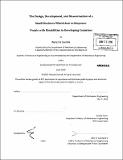| dc.contributor.advisor | Anette Hosoi. | en_US |
| dc.contributor.author | Scolnik, Natasha (Natasha Kathryn) | en_US |
| dc.contributor.other | Massachusetts Institute of Technology. Dept. of Mechanical Engineering. | en_US |
| dc.coverage.spatial | d------ | en_US |
| dc.date.accessioned | 2010-11-08T17:46:15Z | |
| dc.date.available | 2010-11-08T17:46:15Z | |
| dc.date.copyright | 2010 | en_US |
| dc.date.issued | 2010 | en_US |
| dc.identifier.uri | http://hdl.handle.net/1721.1/59923 | |
| dc.description | Thesis (S.B.)--Massachusetts Institute of Technology, Dept. of Mechanical Engineering, 2010. | en_US |
| dc.description | Cataloged from PDF version of thesis. | en_US |
| dc.description | Includes bibliographical references (p. 41). | en_US |
| dc.description.abstract | This thesis discusses the design of a small-business wheelchair that empowers disabled people in developing countries to become entrepreneurs. Disabled people in these countries face tremendous discrimination, making it difficult to find employment and further perpetuating the sentiment that they cannot meaningfully contribute to society. This project attempts to change that, providing disabled people with both mobility and a way to generate an income. It was designed in close collaboration with MobilityCare wheelchair workshop in Arusha, Tanzania and tested by five users in a pilot trial that began in July 2008. Each of the participants was given a small-business wheelchair, business training, and seed money to purchase raw materials. In addition, bank accounts were established at a local wheelchair-accessible bank. The success of this trial proved that the small-business wheelchair is a viable way for people with disabilities to generate an income and improve their livelihoods. Several dissemination strategies have been explored so that wheelchair workshops across the developing world can produce this wheelchair. These include the development of a production manual that will be available online as well as at the next Pan African Wheelchair Association meeting, to be held in 2011. In terms of funding, corporate sponsorship has been determined to be an appropriate way to cover the cost of the wheelchair itself. While microfinance is not currently feasible to fund the start-up costs of each business, it is likely to become more appropriate as it grows and expands its services. | en_US |
| dc.description.statementofresponsibility | by Natasha Scolnik. | en_US |
| dc.format.extent | 41 p. | en_US |
| dc.language.iso | eng | en_US |
| dc.publisher | Massachusetts Institute of Technology | en_US |
| dc.rights | M.I.T. theses are protected by
copyright. They may be viewed from this source for any purpose, but
reproduction or distribution in any format is prohibited without written
permission. See provided URL for inquiries about permission. | en_US |
| dc.rights.uri | http://dspace.mit.edu/handle/1721.1/7582 | en_US |
| dc.subject | Mechanical Engineering. | en_US |
| dc.title | The design, development, and dissemination of a small-business wheelchair to empower people with disabilities in Developing countries | en_US |
| dc.title.alternative | Small-business wheelchair to empower people with disabilities in Developing countries | en_US |
| dc.type | Thesis | en_US |
| dc.description.degree | S.B. | en_US |
| dc.contributor.department | Massachusetts Institute of Technology. Department of Mechanical Engineering | |
| dc.identifier.oclc | 676698788 | en_US |
